

Fetal Psychology. Psychology Today, October 1998 Source: Psychology Today, Sep/Oct98, Vol. 31 Issue 5, p44, 6p, 4c.
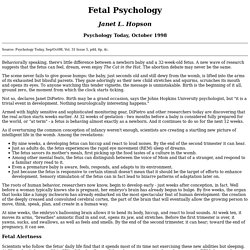
Behaviorally speaking, there's little difference between a newborn baby and a 32-week-old fetus. A new wave of research suggests that the fetus can feel, dream, even enjoy The Cat in the Hat. The abortion debate may never be the same. The scene never fails to give goose bumps: the baby, just seconds old and still dewy from the womb, is lifted into the arms of its exhausted but blissful parents. Not so, declares Janet DiPietro. Armed with highly sensitive and sophisticated monitoring gear, DiPietro and other researchers today are discovering that the real action starts weeks earlier. As if overturning the common conception of infancy weren't enough, scientists are creating a startling new picture of intelligent life in the womb. By nine weeks, a developing fetus can hiccup and react to loud noises.
Fetal Alertness Closer to birth, the fetus sleeps 85 or 90% of the time: the same as a newborn. Uterus. "Hystera" and "Uterine" redirect here.
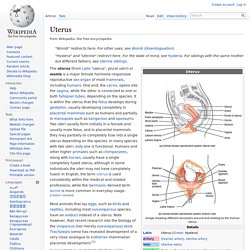
For the state of mind, see hysteria. For siblings with the same mother but different fathers, see Uterine siblings. The uterus (from Latin "uterus", plural uteri) or womb is a major female hormone-responsive reproductive sex organ of most mammals, including humans. One end, the cervix, opens into the vagina, while the other is connected to one or both fallopian tubes, depending on the species. It is within the uterus that the fetus develops during gestation, usually developing completely in placental mammals such as humans and partially in marsupials such as kangaroos and opossums. In monotremes, mammals which lay eggs, namely the platypus and the echidnas, either the term uterus or oviduct is used to describe the same organ, but the egg does not develop a placenta within the mother and thus does not receive further nourishment after formation and fertilization.
Structure[edit] Regions[edit] Layers[edit] Endometrium Myometrium Perimetrium. Encyclopedia Britannica. Freak - definition of freak by the Free Online Dictionary. Freak [friːk] 2. (= enthusiast ) → fanático/a m/f , adicto/a m/f health freak → maniático/a m/f en cuestión de salud peace freak → fanático/a m/f de la paz see also Jesus B freak out Collins Spanish Dictionary - Complete and Unabridged 8th Edition 2005 © William Collins Sons & Co.
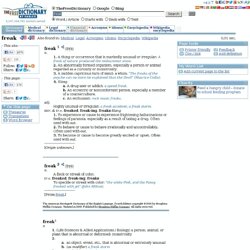
Ltd. 1971, 1988 © HarperCollins Publishers 1992, 1993, 1996, 1997, 2000, 2003, 2005 freak [ˈfriːk] n (= abnormal person ) (offensive) → monstre m adj (= very unusual ) [ event, action, accident ] → insolite vi [ person ] (= feel scared and disorientated ) → flipper > freak (inf) jazz/movie freak → Jazz-/Kinofreak m (inf) ; health/fitness freak → Gesundheits-/Fitnessfreak m (inf) ( inf : = weird person ) → Irre (r) mf ; he looked at me as though I were some sort of freak → er sah mich an, als ob ich vom Mond wäre Collins German Dictionary – Complete and Unabridged 7th Edition 2005. © William Collins Sons & Co. Freaks (1932. Weirdo - definition of weirdo by the Free Online Dictionary. The American Heritage® Dictionary of the English Language, Fourth Edition copyright ©2000 by Houghton Mifflin Company.
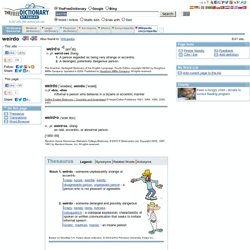
Updated in 2009. Published by Houghton Mifflin Company . All rights reserved. Michel Foucault. Born in Poitiers, France to an upper-middle-class family, Foucault was educated at the Lycée Henri-IV and then the École Normale Supérieure, where he developed an interest in philosophy and came under the influence of his tutors Jean Hyppolite and Louis Althusser.
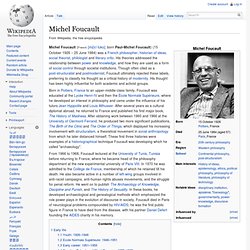
After several years as a cultural diplomat abroad, he returned to France and published his first major book, The History of Madness. After obtaining work between 1960 and 1966 at the University of Clermont-Ferrand, he produced two more significant publications, The Birth of the Clinic and The Order of Things, which displayed his increasing involvement with structuralism, a theoretical movement in social anthropology from which he later distanced himself. These first three histories were examples of a historiographical technique Foucault was developing which he called "archaeology". Early life[edit] Youth: 1926–1946[edit] "I wasn't always smart, I was actually very stupid in school...
École Normale Supérieure: 1946–1951[edit] Surhey Sins Sxy Black Fishnet Stockings. Aluminum_fence_4.jpg (JPEG Image, 2304 × 1728 pixels) - Scaled (36%) Symmetric-curve-3D-wallpaper-530x645.jpg (JPEG Image, 530 × 645 pixels) - Scaled (99%) Hannah Waddingham In Fishnet Stockings. Bring Out the Gimp - Pulp Fiction (9/12) Movie CLIP (1994) HD.